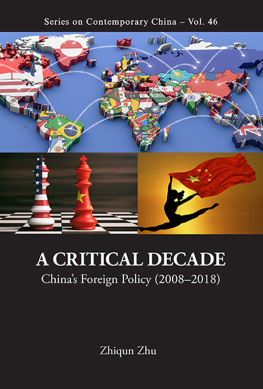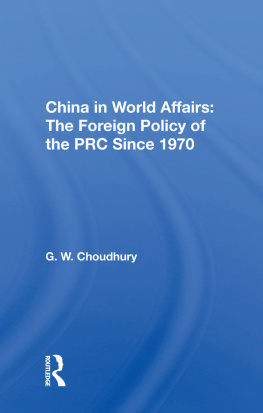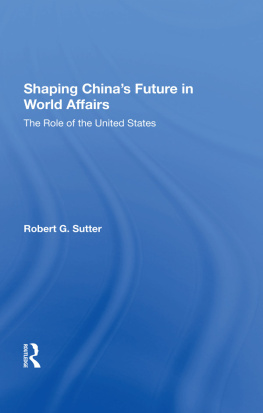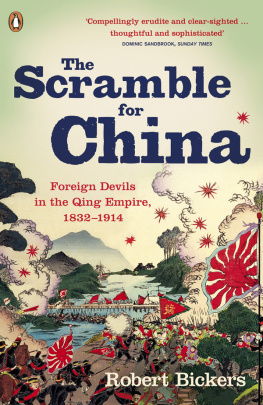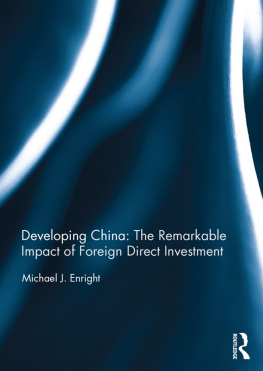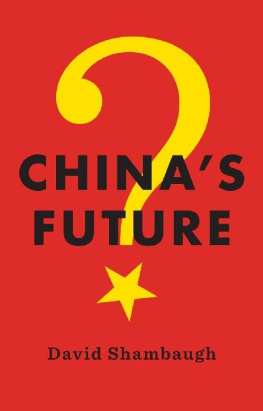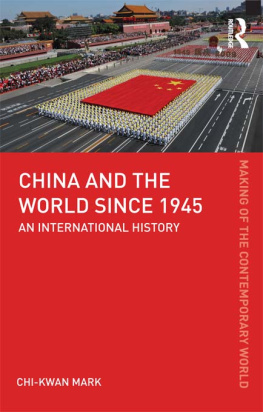C HINAS TRANSFORMATION over the past 250 years has been part of its internationalization. For a long time foreigners took advantage of China, a process that unsurprisingly bred resentment among most Chinese. But at the same time, some of those who lived in the country made use of what came from the outside to change China and change themselves. The country today has become a hybrid of what has developed internally for centuries and what has come from abroad. Quite a number of Chinese, as we have seen in this book, are well equipped to handle these forms of hybridity. They are resourceful beyond their means, both because they stand in a long tradition and because they have learnedsometimes the hard waythe value of flexibility when confronting major challenges. China is on its way to developing distinct forms of modernity, connected to what has been happening in North America, Europe, and Japan, but still separate, because it comes out of a very particular Chinese past.
The problem for the historian in discussing Chinese modernities and their future is that what went before threatens to overwhelm the present. China, as its inhabitants are fond of reminding us, has so much past, so much perceived continuity, that it sometimes becomes a perceptual barrier against dealing effectively with what goes on today. One key argument in this book has been that even as one should respect the Chinese preoccupation with the past, one should not be daunted by it. China has a very long history, and some of it may be seen as continuous, in a way that Europes and certainly Americas are not. But the most important aspect of China today is how it has taken on a set of changes that were happening globally in the nineteenth and twentieth centuries and made them part of what the country is now. It has embraced change, not always for the good, but with effects that put it right next to the United States in terms of inconstancy and changeability. For a rather old-fashioned European like myself, China today is distinctly, and sometimes embarrassingly, about the rapidity of change, about uncertainties, willingness to copy, and the impermanency of all things.
Even if China were to transform its political system into something more like that of the United States or, for that matter, Japan, it would remain a hybrid society in terms of its relationship with the outside world, just as it has been from the beginning of our story. One part would be outward-looking, seeing opportunity. Another would be looking inward, sensing danger. Believing that the first one is good and the second bad would be a mistake for Chinese and foreigners alike. History does not break down as neatly as that. Some of those who have been looking outward, such as Mao Zedong or, for that matter, the wartime collaborator Wang Jingwei, have seen opportunities that have turned into nightmares for Chinese and foreigners alike. And some of those who have looked inward and been mostly afraid have attempted to reestablish that domestic congruence and balance that both China and the worlds relationship to China have sorely needed.
Our final chapter will look at how Chinas relations with the rest of the world will likely develop, based on what we know today. As all predictions it is grounded on guesswork. As we observed at the beginning of this book, a number of current estimates have postulated that China sometime toward midcentury will be the worlds largest economy and the worlds mightiest state. But even if that were so, it would not help us predict Chinas behavior as it is reaching these exalted positions. Some knowledge of the past may help, at least as far as direction and possible choices are concerned. The contradictions that are built into Chinas modern experience will not go away as its status grows, and some of them will become more acute. The amount of transformation that China and the world watching China are yet to see will be mind-boggling. Some of itsuch as minority relations or class readjustments within Chinahave the potential for becoming violent and controversial. Other parts will, I believe, be less confrontational than what most people think. The relationship to Taiwan, or even to a reunified Korea, a more independent Japan, or a more assertive Vietnam, will be based less on confrontation than compromise as long as the development inside China itself makes that possible. The central problem for Chinas foreign affairs in the future is that it is an enduring empire that increasingly behaves like a modern nation state. It may, in the long run, turn out to be more like the United States, integrating its minorities and controlling its neighbors, or like Britain, France, or Russia, giving up its imperial pretensions based on principle or economic necessity. Whatever way it turns, it will be impossible to separate the internal from the external in Chinas search for modernities of its own.
W HOEVER WANTS TO UNDERSTAND Chinas options must begin with Singapore, Taiwan, Hong Kong, and Macao, the four Chinese societies that are not directly ruled by the CCP. While the latter two are now parts of China, they retain their own judicial system and governmental arrangements, and these have proven quite resistant to PRC attempts to change them. Singapore is, of course, an independent multiethnic state, located far away from China, but with a majority Chinese-ancestry population. Taiwan is a democratic Chinese republic, located right off the mainland of China, whichby an accident of historyhas been independent of the Peoples Republic on the mainland for sixty years. All of these are Chinese states, and they are always at the core of Chinese thinking about the PRCs future, whether your Chinese interlocutors will admit it or not. The PRC is in need of ideas on good governance, and its leading men and women believe that they can get such ideas from other Chinese, as rulers in Beijing have so often done in the past.
The advice given by those who look at the external Chinese world goes in very different directions. Those who stress the need for elite control, usually point to Singapore and its experience under Lee Kwan Yew. Singapore is today a very well-regulated society with authoritarian traits, and many Chinese who go there from the PRC remarkin astonishment, if it is their first visiton how much better it works as a model for stability and organization than China does. Lee and his men got much rightnot least in poverty alleviation and growth economics but also in planning for the future: Singapores sovereign wealth funds are the envy of the world. But Singapore is a city state, no easy model for a country that contains a fifth of humanity. Singapore therefore is an ideal for some within the CCP, but not a reality that is easily adhered to. And even if the Lion City todaywith its ban on chewing gum and its managed democracyshocks many Westerners with its censoriousness, it is still a big stone throws away from the PRC, where people are executed for what in Singapore would lead to a stiff fine, and where debates are utterly suppressed that would not raise a wrinkle in Singapore today.
Hong Kong and Macao are the strange cases, colonial remnants within China itself, though taken over by the PRC with much fanfare in 1997 and 1999 respectively. But takeover did not mean political and juridical subjugation. Beijing was very aware that Hong Kong, especially, was the hen that laid the golden eggs. It connected trade and industry, above all in south China, with international markets, and its British colonial justice and order was conducive to its role as a center for finance that contributed to Chinas growth. Beijing is less enamored by the traces of democracy that the British attempted to add to their colony almost as an afterthought in the 1990s, after they had negotiated its return to China. But while the PRC has been eager to avoid a furthering of political pluralism in Hong Kong, the Communists have respected the former colonys unique position as a city that in essence is ruled by English common law within the borders of a Communist state. Although Shanghai is moving to become the commercial capital of China, Hong Kong is likely to retain much of its position because of its laws, its good administration, and its relative freedom of speech. At the moment of writing, the market capitalization of the two is about equal; their stock exchanges are fifth and sixth in the world, respectively.



